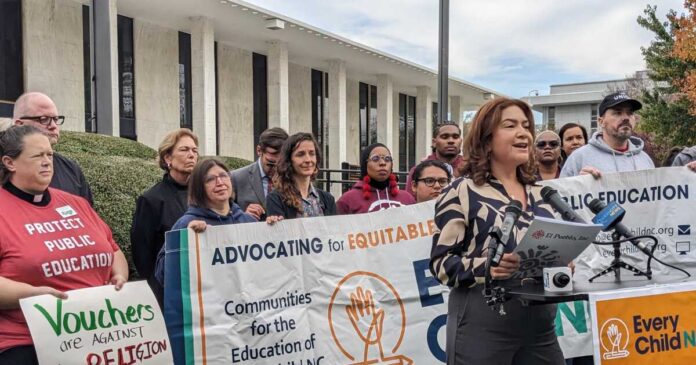
State senators finalized an override of Gov. Roy Cooper’s veto of House Bill 10, which significantly expands funding for private school vouchers, known as Opportunity Scholarships, over the next decade.
“This is such a great day for our family and for thousands of other families across the state,” said Rachel Brady, the mom of a kindergartner who has waited on this law since spring to help their family afford private school tuition.
Her son was one of about 55,000 students waitlisted for an Opportunity Scholarship after a 2023 law expanded eligibility for the vouchers to families of any income, including those already attending private schools.
“Unconscionable, egregious and immoral – that is what describes this HB10. There are so many other things that money could be used towards.” -Nancy Rogers, an early education advocate.
An influx of applicants pushed some middle income families like Brady’s onto a waitlist that also includes thousands of families who make more than $260,000. Republican lawmakers urged for more funding to clear that waitlist.
The law provides $463 million in funds for Opportunity Scholarships for this current school year, which will be paid as reimbursements to wait-listed families who enrolled in private schools this fall. Additional funding in the law for future years – plus existing recurring funds to the program’s reserve – escalates the total cost of Opportunity Scholarships to nearly $6.5 billion between now and 2033.
Not everyone is celebrating.
“Unconscionable, egregious and immoral – that is what describes this HB10,” said Nancy Rogers, an early education advocate who spoke at a press conference Tuesday opposing the override. “There are so many other things that money could be used towards.”
Advocates for public education say funding is needed to raise teacher pay in public schools, recruit school support staff, and keep the child care industry afloat. N.C. Association of Educators’ President Tamika Walker Kelly called the bill “irresponsible” in a statement. Democrats argued the funding could be better spent on Helene relief than on wait-listed voucher applicants, most of whom are in higher income tiers.
“This is a budget busting expense,” said Senator Natasha Marcus, D-Mecklenburg. “The Office of State Budget & Management has forecast a budget shortfall in the near future due to the tax cuts we’ve already passed, the impacts of earlier expansion of the voucher program, and the Helene funding that we should be focused on.”
Marcus’ comments opposing the bill included concerns that the vouchers promote school segregation, allow public funding to go to schools that discriminate on the basis of disability or sexual orientation, and risk the potential for fraud and embezzlement due to a lack of accountability measures for private schools receiving funds.
During House floor debate Tuesday, Rep. Tricia Cotham, R-Mecklenburg, accused Democrats of setting up “a false choice” between funding for hurricane relief, public schools, and Opportunity Scholarships. Cotham, who sponsored the voucher funding proposal from its inception, also responded to arguments by Democrats that the program sets few accountability measures for private schools.
“I don’t want to hear about the accountability piece. The accountability piece is the parents,” said Cotham. “If a school doesn’t work for them, they don’t have to send their child there.”
Another bill the Senate passed Wednesday takes one step toward more accountability for the program. A provision directs a newly created Office of Learning Research to recommend a nationally standardized test for Opportunity Scholarship recipients and public school students for the purpose of evaluating the academic outcomes of students receiving vouchers.
While Opportunity Scholarship funding has dominated education-related discussions around House Bill 10, it would also add annual funding for vouchers to students with disabilities and provide funding for enrollment growth at community colleges and K-12 public schools.
NCGA ratifies omnibus Senate Bill with many education provisions
State lawmakers also passed a Helene relief bill that strips power from newly elected Democrats to executive offices and packs in a variety of education policies. The bill will go to Governor Roy Cooper for consideration.
Here are some of the education related measures in the bill:
-
The bill would remove authorities from the state superintendent, as Democrat Mo Green is set to take office in January. The Center for Safer Schools would transfer from the Department of Public Instruction to the State Bureau of Investigation and the state superintendent would lose oversight of the center.
- The state superintendent would no longer be able to initiate a final appeal on decisions about charter school applications, renewals, and revocations. Only charter school leaders will be able to make an appeal.
- The bill appropriates $33.75 million for child care stabilization grants, to extend funding to support teacher compensation at child care centers for another three months. Child care advocates have lobbied for longer term funding to help keep centers open after federal funding for these grants expired.
- The bill allocates $1.5 million to create an Office of Learning Research, housed at the North Carolina Collaboratory. The office would be tasked with researching education policies, including setting a testing standard for the Opportunity Scholarship program.
- The bill would expand the pilot program SparkNC to all North Carolina high schools. The program established learning labs where students can study technology skills with industry professionals. The bill would allow these courses to fulfill a statewide computer science requirement that takes effect in 2026.
- The bill would allow school districts to apply for grants to receive proceeds from taxes on sports wagering.
- The bill updates a pilot program known as Advanced Teaching Roles, which allows highly effective K-12 teachers to reach a larger number of students and mentor other teachers while continuing to serve in classrooms. Under the updates, the State Board of Education can award funds for salary supplements for teachers hired to take on advanced roles.



